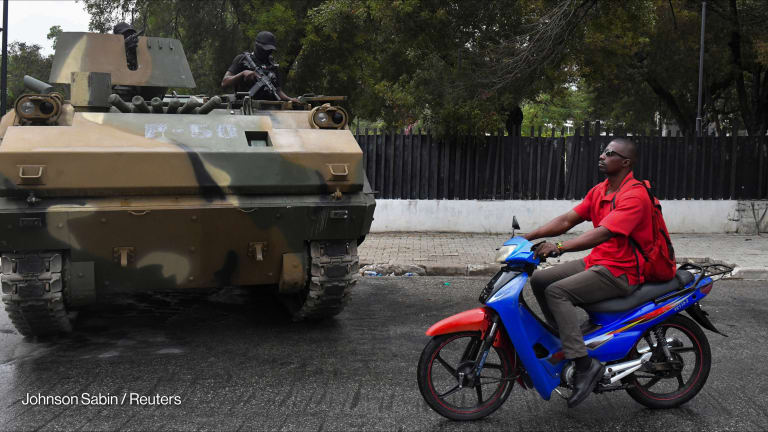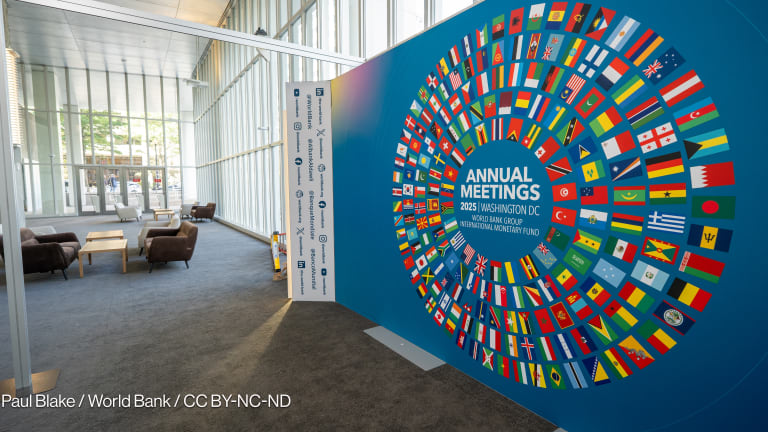
UNITED NATIONS — Protection for civilians and aid workers in conflict zones and financing are two of the top issues driving Mark Lowcock’s immediate agenda, the new United Nations humanitarian chief indicated to staff during his first week on the job.
Lowcock, a career British civil servant, maintained a relatively low-key week as he officially stepped forward to lead the U.N. Office for the Coordination of Humanitarian Affairs. But a Sept. 1 email addressed to colleagues offers an idea of how he plans to drive the U.N.’s humanitarian work in an increasingly challenging political and financial climate.
“Our teams are all operating in difficult environments in which we are witnessing atrocities and abuses, including siege, sexual exploitation and abuse, and the use of child soldiers. Given the scale of these violations in today’s world, I think it would be helpful for us to share some of our experiences and thoughts on how we can deal with this, both in terms of our advocacy but also operationally,” he wrote in the note, obtained by Devex.
He also reiterated his support for “brave aid workers [who] work in dangerous places,” in a statement, as well as in one of his first public tweets under the official U.N. Relief Chief handle.
Locock met with staff at a meeting in New York on Sept. 5, his first official full day, as IRIN reported, following a listening tour with colleagues. His spokespeople declined to provide details of this meeting, but said that his first mission — to Nigeria, where OCHA is working to reach 6.5 million people with life-saving assistance, and Niger, where 1.8 million people are facing a food crisis — would occur later this week.
DfID's Lowcock welcomed as new OCHA head, but faces challenges
Mark Lowcock now has the dual role of under-secretary-general for humanitarian affairs and U.N. emergency relief coordinator, heading the Office for the Coordination of Humanitarian Affairs, as the U.N. agency continues to undergo budget cuts.
Lowcock is taking over the reins from his predecessor, Stephen O’Brien, at a delicate time, just four months after his appointment. Following steady financial growth throughout the 2000s, poor exchange rates contributed to OCHA’s budget taking a hit this year, dropping by $49 million, or 19 percent from the previous year, reducing the budget from $309 to $260 million in 2017.
Meanwhile, as the U.N. works with partners to respond to a historic number of emergencies and protected humanitarian situations, attacks on aid workers in conflict zones are considered to be worsening. And as OCHA is working to scale down and adjust to its smaller budget, it may also have to consider what U.N. Secretary-General António Guterres’ system-wide reform plans could mean for its work in Geneva, New York and in the field, where it has been criticized for not serving as the focal point it was designed to represent.
“I think the challenging part is this is being done within the context of a $20 million cut in their budget, so anyone will tell you, whether it is a U.N. agency, or a NGO, it is a hell of a lot easier to do strategic planning when your budget is growing rather than contracting,” said Joel Charny, director of Norwegian Refugee Council USA.
“The point is, whether OCHA is phasing out certain functions, like disaster risk, or technical work, or private sector engagement, or whatever, that is probably not going to lead to savings of $20 million. So there are still tough decisions that need to be made or offices that need to be closed,” Charny continued. “There is a real tension between balancing New York and Geneva, as opposed to the field — and can you streamline that kind of overall structure? Where should people be located? There is a lot of internal politicking for obvious reasons.”
Lowcock could face something of a balancing act, especially as he holds the dual positions of head of OCHA and the emergency relief coordinator for the broader international humanitarian community.
“He is facing an environment where there will be competing demands on him and he has an unenviable task of how to weigh those up, so how does he meet the various needs we have?” said Patricia McIlreavy, vice president for InterAction’s humanitarian policy and practice. “There is a whole list of crises he could be speaking out about and calling attention to in terms of the scale and the number of crises. So how does he determine which of those he is going to spend his energy and time speaking to member states and donors about and calling attention to?”
Lowcock will address both attacks on aid worker and financing in New York on Sept. 17, during the annual Inter-Agency Standing Committee Principals meeting, which brings together heads of most U.N. agencies — including UNICEF, the World Health Organization, UNDP, and the World Food Programme — as well as a few civil society groups, to coordinate on humanitarian action. InterAction is one of these civil society members.
Kristalina Georgieva, the chief executive officer of the World Bank, will also attend this upcoming meeting, Lowcock wrote in the email, following up on an interest to discuss how “humanitarians can work better with the World Bank.” He also noted that he wanted the meeting to be an informal discussion where ideas can be tested, and that the meeting would not have an official record.
“I would like this meeting to be an informal, interactive and free-flowing discussion between Principals. I want it to be a safe-space in which we can test ideas and speak freely with one another. I hope we can avoid scripted talking points. There will be no note-takers, no official record of the meeting, and no plus-ones. If action points arise from the meeting, I will ensure they are shared afterwards,” Lowcock wrote.
McIlreavy pointed to this proposed open meeting format — a departure from the norm — as a potentially positive sign.
“What we are looking for from our side is strong leadership,” explained McIlreavy. “The promising thing from our side is he has asked that it be a real, free-flowing conversation for people [to] come and be prepared to talk, not from their talking points and to really look at the issues and have a conversation about where we need to improve and move ahead. Let’s see how the meeting goes.”
The upcoming September meeting will be followed by an October meeting of emergency directors, which McIlreavy said some might watch to see if Lowcock will attend.
Read more international development news online, and subscribe to The Development Newswire to receive the latest from the world’s leading donors and decision-makers — emailed to you free every business day.
Read more stories on aid worker security:
► Meet the 'champions' getting tough on sexual assault against aid workers
► Q&A: More than bunkers and barbed wire — why security jobs are fascinating
► Advocacy NGO shining a light on sexual assault of aid workers set to close
► Aid groups see rising security risk in Mali even as needs grow








